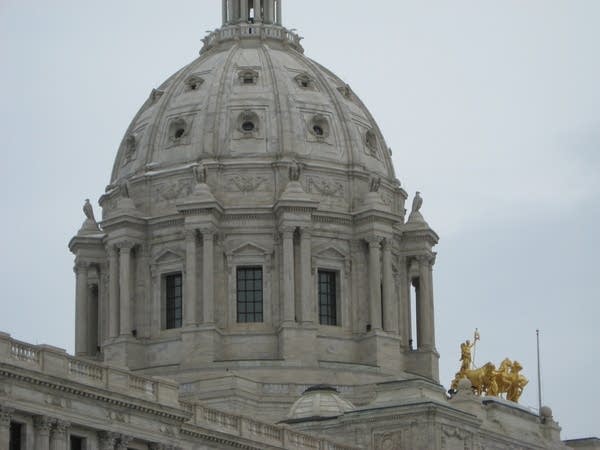Pawlenty expects deficit in current state budget

Minnesota finance officials will announce Thursday the size of a projected budget deficit for the next two years. Gov. Pawlenty has previously said it will be a substantial, multi-billion dollar shortfall. He's also now preparing for an unexpected shortfall in the current budget.
In a conference call with reporters, Pawlenty would only say this year's shortfall won't be overwhelmingly or unmanageably large. Still, the Republican governor said legislative leaders will need to take quick action in January to plug the hole.
"If they are unwilling or unable to come to some agreement in that regard, and we get some indication of that, we'll move forward with the unallotment if need be," he said.
Unallotment is the governor's power to cut spending on his own if the state faces an imminent deficit.
Create a More Connected Minnesota
MPR News is your trusted resource for the news you need. With your support, MPR News brings accessible, courageous journalism and authentic conversation to everyone - free of paywalls and barriers. Your gift makes a difference.
Nearly all of the nation's governors are facing similar financial challenges. Forty-one states are facing budget deficits due to the bad economy and reduced tax revenues.
President-elect Barack Obama told governors at their meeting in Philadelphia that he wants to ease the burden with an economic recovery plan. Obama also asked the governors for their advice in drafting that plan, which would include billions of dollars for infrastructure projects.
"My attitude is that if we're listening to the governors, then the money we spend will be well spent," he said. "And it means that it's going to get working faster, and the people in your states are going to experience prosperity sooner."
Pawlenty described the meeting as constructive and positive. But Pawlenty said he raised concerns with the president-elect about government bailouts and a massive federal deficit that will grow even larger with another economic stimulus package.
He said he wants a limit set on the federal credit card.
"All this money that people are asking for from the the federal government and the money that they send out is money they don't have," he said. "The federal government is broke. They don't have a surplus. They have a deficit. They're deficit spending and passing on the obligations to our children and our grandchildren. In the meantime, the debt is being supported by sovereign wealth funds, the Chinese and others who are purchasing the debt. And it's gravely concerning the amount of money that's being thrown at this problem."
Pawlenty, who supported John McCain for president, said the nation's economic crisis might be the impetus for needed spending reforms in government, especially in health care programs like Medicaid.
He said he might not want money from the federal government to maintain Medicaid in its current form. Pawlenty also questioned the impact of Obama's proposal to jump start infrastructure projects in states.
"That may create some economic activity on the ground, in terms of jobs, which would have a positive benefit," he said. "But it doesn't do anything for our impending deficit."
DFL leaders in the Minnesota House are taking a more welcoming view to a potential check from the federal government. House Speaker Margaret Anderson Kelliher said she's very interested in the economic stimulus plan.
"Well, I think in a state that has its highest unemployment rate in 25 years and has been frankly not doing as well as we have historically done in our economy, we definitely need to be interested in all of the tools in the tool box," she said. "And if one of the tools is an infrastructure investment partnered with the federal government, I think we should be doing that."
Kelliher sent a letter to President-elect Obama supporting his proposal for infrastructure funding. She also recommended additional federal assistance to states to fund education and health care programs.
